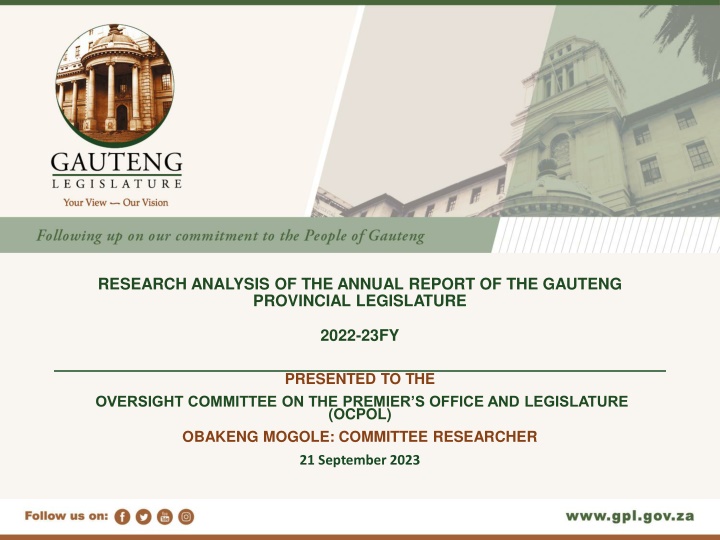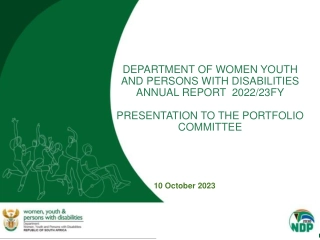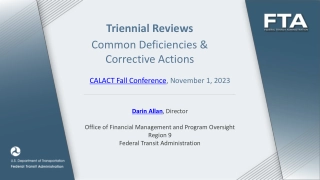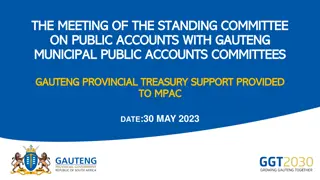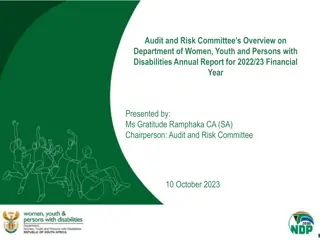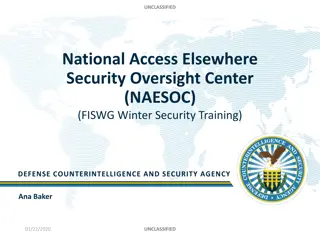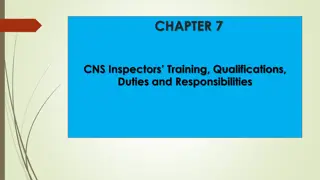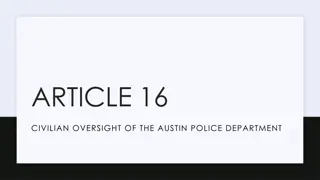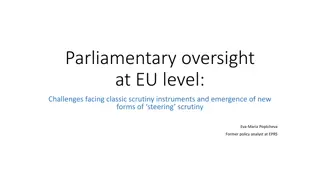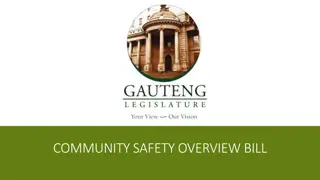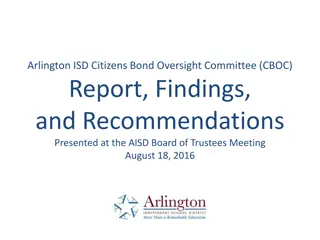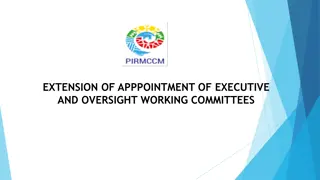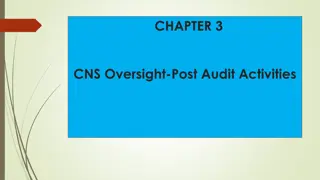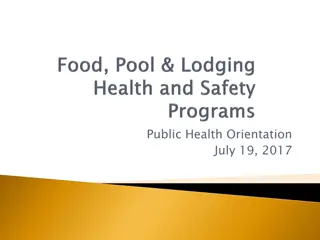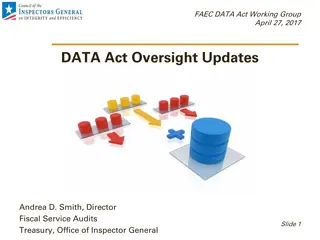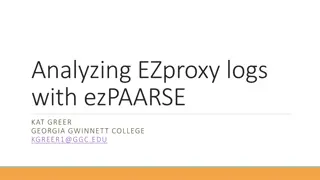Analysis of GPL Annual Report 2022-23 FY: Insights for OCPOL Oversight
This analysis delves into the annual report of the Gauteng Provincial Legislature for the 2022-23 fiscal year, examining its performance against budget targets and operational efficiency. Key sections include an overview, policy framework, macro and micro analysis, Auditor General's report, and questions for consideration.
Download Presentation

Please find below an Image/Link to download the presentation.
The content on the website is provided AS IS for your information and personal use only. It may not be sold, licensed, or shared on other websites without obtaining consent from the author.If you encounter any issues during the download, it is possible that the publisher has removed the file from their server.
You are allowed to download the files provided on this website for personal or commercial use, subject to the condition that they are used lawfully. All files are the property of their respective owners.
The content on the website is provided AS IS for your information and personal use only. It may not be sold, licensed, or shared on other websites without obtaining consent from the author.
E N D
Presentation Transcript
RESEARCH ANALYSIS OF THE ANNUAL REPORT OF THE GAUTENG PROVINCIAL LEGISLATURE 2022-23FY PRESENTED TO THE OVERSIGHT COMMITTEE ON THE PREMIER S OFFICE AND LEGISLATURE (OCPOL) OBAKENG MOGOLE: COMMITTEE RESEARCHER 21 September 2023
1. Introduction 2. Overall Assessment of the GPL Annual Report 3. Policy Framework PRESENTATION OUTLINE 4. Macro Analysis 5. Micro Analysis 6. Auditor General Report: GPL 7. Questions for Consideration
INTRODUCTION This presentation provides an analysis of the performance of the Gauteng Provincial Legislature during the 2022/23 financial year in relation to the budget and targets contained in the Annual Performance Plan (APP). Firstly, this brief will undertake a comparison of both non-financial (outputs) and financial (inputs) indicators of the GPL during the period under review. Second, this brief assesses whether the institution was able to adhere to principles of efficiency and effectiveness during the period under review. Furthermore, there is an overall discussion of the performance of the GPL. It is thus worth stating that the relationship between plans and budgets indicates operational effectiveness and efficiency.
INTRODUCTION Annual reports remain key reporting instruments for departments and all accounting entities to report their performance targets and spending on the budget against the strategic plans. This brief was developed in accordance with the Sector Oversight Model (SOM). This conceptual model provides that the annual report process will assist the Committee to formulate ideas for the coming budget. The committee should be able to develop an idea of the state of affairs for a given priority. This report is presented at the year that the country is celebrating 29 years of democracy. As indicated above, the analysis evaluates whether the GPL has delivered on the commitments made in its Annual Performance Plans (APP) against the budget.
INTRODUCTION In terms of analysing the GPL Annual Report the following documents were used: Gauteng Provincial Legislature: Approved 2020-2025 Strategic Plan Gauteng Provincial Legislature: APP 2022/23 Gauteng Provincial Legislature: Annual Report 2022/23 SOM Tools utilised: Budget Variance Tool- Which examines the variances between estimates, budgets, adjustments and actual expenditure, with a view to ascertaining the quality of a department s planning in respect of a program and sub-program.
INTRODUCTION Interdependent Priorities Tool- Annual Performance Plan (APP)/ Budget and Annual Report for evidence of cooperation with other Departments; to find evidence of how the Dept. has leveraged off others resources vis- -vis certain Priorities; The Programmatic Continuity Tool- This tool tracks program lifespan and continuity to determine renamed or dropped programmes. Information Level Test-This tool assesses the data presented and its reliability and of a good quality. The tools primarily: offer various approaches to determine effectiveness /efficiency. highlight potential problems in Dept. submissions, e.g. a budget. helps frame questions for Committees. helps to bolster the oversight process.
OVERALL ASSESSMENT OF THE GPL ANNUAL REPORT It is evident from the analysis that the GPL achieved a Clean Audit during the period under review. This is third year running that the GPL has achieved a Clean Audit finding. It should be noted that the overall institutional performance has achieved 83%, whereby 19 out of the 23 planned performance indicators/targets were achieved during the year under review. In terms of the budget expenditure performance the GPL was allocated a budget of R825.16 million and it spent R756 million, and this represented 91.6% expenditure pattern. It underspent by R68.97 million and this is attributed to: Personnel expenditure consequential to approved positions not filled. Planned but not executed activities
OVERALL ASSESSMENT OF THE GPL The above provided reasons for budget underperformance are the same ones that were provided during the quarterly and the 2020/21 annual reporting periods. The Committee should be concerned with this recurring variance on the budget spending. During the period under review, the GPL continued to hold the Executive to account through a myriad imperatives of the SOM. These were done through the achievements on the Strategic Outcomes. With respect to Strategic Objective 01: Enhanced Oversight and Accountability towards service delivery: The GPL continued to discharge its oversight and scrutiny on the work of the Executive. Quarterly, budget and annual as well as FIS reports were adopted. Furthermore, question papers were produced and communicated to all MPLs. There was an improved consideration of responses to resolutions of the House.
OVERALL ASSESSMENT OF THE GPL With respect to Strategic Objective 02: Increased Responsiveness of Laws to meet need of the people of Gauteng: The GPL was able to process a number of Bills, these were Section 76 and 77 as well as Provincial Bills. In terms of the Strategic Objective 03: Enhanced Meaningful Public Participation, the GPL was able to undertake public participation and stakeholder engagements throughout the province. Several civic education initiatives were held as part of raising awareness of the work of House and Committees. Preparatory workshops with identified stakeholders of the Childrens, Youth and Women s Sectoral Parliaments. An economic seminar was also held as part of stakeholder engagement. Both social and traditional media used to promote the work done by the GPL and its Committees. Virtual and face to face interactions were intensified during the period under review as a result of lifting of the state of disaster during the period under review. This was to ensure that the people of the province participated in the business of the legislature.
OVERALL ASSESSMENT OF THE GPL In terms of Strategic Objective 04: Improved alignment and collaboration between organs of the state, the GPL continued to collaborate with various organs of state during the period under review. At the centre of such activities was a way of strengthening the legislative sector. With respect to Strategic Objective 05: Enhanced compliance with all relevant fiduciary requirements and principles of good governance, the GPL achieved and maintained an Unqualified Opinion without material findings. As part of entrenching ethical conduct, the GPL conducted an e-disclosure of all public officials as well declaration of interest of MPLs. Another observation is that the Annual Report does not reflect on outcomes and impact but rather on inputs and outputs which are administrative in nature. The Committee should then express a concern.
LEGISLATIVE AND POLICY FRAMEWORK The Doctrine of Separation of Powers The Constitution of the Republic of South Africa The Financial Management of Parliament and Provincial Legislatures Act The Legislative Sector Oversight Model The six Pillars of an Activist and Transformative Legislature Sustainable Development Goals Agenda 2063 National Development Plan
MACRO ANALYSIS PROGRAMME ANALYSIS This section focuses on the relationship between planned targets as articulated in the APP and the Annual Report. Information on the Department performance per Programme for the period under review: During the 2022/23 financial year the GPL set 23 targets and it managed to achieve 19 and this translates to 83% of the planned targets.
MACRO ANALYSIS PROGRAMME INFORMATION Programme One: Leadership and Governance This programme is charged with the responsibility of providing overall political and strategic leadership within the GPL. It manages the programme of the House and Committees. This is done through three directorates, namely: Administrative Operations, this supports offices of the Office of the Speaker, Office of the Deputy Speaker, Legislature Services Board Oversight and Strategic Liaison, this supports the Office of the Chairperson of Committee and the Deputy Chairperson of Committees Inter-Legislature Relations directorate is responsible for the sector wide coordination and collaboration and rendering protocol services.
MACRO ANALYSIS PROGRAMME INFORMATION Programme One: Leadership and Governance Although this programme contributes to all GPL strategic objectives, during the period under review it contributed to four strategic objectives. This programme achieved all its set targets. Strategic Objective One: Improved Accountability by the Executive to the Legislature in respect of service delivery The committees of the House are core to the mandate of the legislature as they oversee service delivery by the Executive to the people of the province. This strategic objective is aimed at ensuring that the GPL mandate to conduct oversight and scrutiny over the Executive is discharged.
MACRO ANALYSIS PROGRAMME INFORMATION Programme One: Leadership and Governance Strategic Objective One: Improved Accountability by the Executive to the Legislature in respect of service delivery During the period under review, the GPL was able to ensure that hybrid and virtual House and Committees discharged their oversight, public participation and law-making functions properly. This was in line with the parliamentary programme and addressed key activities that emanated from the NCOP. T he GPL applied its oversight tools such as committees inquiries, questions, motions, oversight visits, resolution tracking mechanism and conducted FISes. There was also an increased application of unannounced visits as a way of validating information provided by the Executive
MACRO ANALYSIS PROGRAMME INFORMATION Programme One: Leadership and Governance Strategic Objective Two: Improved responsiveness of laws to meet the needs of the people During the period under review the GPL put several mechanisms in place to process a number of Section 76 and 77 as well as Provincial bills. 27 bills were processed and 4 of these were enacted into law.
MACRO ANALYSIS PROGRAMME INFORMATION Programme One: Leadership and Governance Strategic Objective Four: Improved alignment and collaboration between organs of state The GPL, guided by the Inter-Institutional Relations strategy, participated at various several inter legislature activities both locally and internationally. This came after the lifting of the national state of the disaster in April 2022. Travel and physical engagements were facilitated within and beyond the borders of the country. In this reporting period, the legislature participated in the National Speakers Forum, SALSA and LSS Task Team meetings, Gauteng Speakers forum as well as it held various engagements with academia, civil society formations and consulates as part of collaborative and transformed legislative sector.
MACRO ANALYSIS PROGRAMME INFORMATION Programme One: Leadership and Governance Strategic Objective Five: Enhanced compliance with all relevant fiduciary requirements and principles of good governance During the period under review, the GPL held an Ethics workshop in collaboration with the National Prosecuting Authority (NPA). This workshop was led by the Deputy Speaker and the Integrity Commissioner. Furthermore, the GPL achieved the e-disclosure of staff, publication of the Members Register and fraud prevention awareness as part of promoting ethical conduct within the GPL community. Under the fraud risk awareness initiative, several activities were undertaken which include, among others, the review of the Fraud Risk Management Policy and GPL Code of Conduct, compilation of a control assessment report on the fraud risk register for the 2021/2022 financial year, and compilation of the fraud risk register for the 2022/23 financial year. The Register for Members Interest was successfully published, and e- disclosure forms were administered accordingly
MACRO ANALYSIS PROGRAMME INFORMATION Programme Two: Office of the Secretary The Office of the Secretary is responsible for the overall administrative functions within the GPL. The strategic objective of this programme is to ensure that there is the implementation of the institutional mandate of oversight and scrutiny, law making, public participation and cooperative governance. This programme contributes to all strategic objectives. It ensures alignment of strategy to operational plans, monitor GPL programmes in their performance and directly responds to Strategic Objectives 5: Enhanced compliance with all relevant fiduciary requirements and principles of good governance. All three performance indicators and targets that were planned were achieved.
MACRO ANALYSIS PROGRAMME INFORMATION Programme Two: Office of the Secretary Strategic Objective Five: Enhanced compliance with relevant fiduciary requirements and principles of good governance In line with the Financial Management of Parliament and Provincial Legislatures Act (FMPPLA), the programme ensured that the institution complies with the prescripts of this Act by ensuring that six performance reports (that is, four quarter reports, one mid-year, and one annual report) are compiled and submitted to the Executive Authority timeously. Additionally, the institutional planning support for the 2022/23 financial year was provided to committees as well as Administration programmes and the reports thereof were subsequently tabled before all the oversight structures for approval.
MACRO ANALYSIS PROGRAMME INFORMATION Programme Two: Office of the Secretary Strategic Objective Five: Enhanced compliance with relevant fiduciary requirements and principles of good governance The Office of the Secretary ensured that there was an implementation of the GPL Strategy through tracking decisions of Presiding Officers and Office bearers. In addition, the GPL implemented the 2022/23 APP as raised by the AG during the 2020/21 findings. Furthermore, the 2023/24 draft APP and operational plans were developed and submitted as per the legislative prescripts. During the period under review the Secretariat deliberated and adopted various policies and reports related to planning, reporting and financial management. Monthly and quarterly financial reports were considered and approved during the period under reviewed.
MACRO ANALYSIS PROGRAMME INFORMATION Programme Two: Office of the Secretary Strategic Objective Five: Enhanced compliance with relevant fiduciary requirements and principles of good governance In compliance with the contract management framework, the status of all contracts was monitored and tracked to ensure that the decisions of the Legislature Acquisition Council were properly adhered to. The programme also continued to provide oversight and ensured seamless planning, budgeting and reporting throughout the year under review. It should also be noted that the transversal mainstreaming was embedded within the institution. All the transversal mainstreaming trainings were held as part of building capacity on issues of marginalised groups. Five (5) training sessions were successfully conducted. The Committee should be appraised on how these planned targets were achieved even though there is a vacancy of a gender focal point person and how this vacancy is affecting the issues that reside within that space.
MACRO ANALYSIS PROGRAMME INFORMATION Programme Two: Office of the Secretary Strategic Objective Five: Enhanced compliance with relevant fiduciary requirements and principles of good governance Through the Project Governance Office, the GPL was able to play leadership and oversight on institutional projects such as the Space optimisation, records management and money bills. It would be in the interest of the Committee to be appraised on the progress of these projects.
MACRO ANALYSIS PROGRAMME INFORMATION Programme Three: Corporate Support Services This programme gives support within areas of Human Resources, ICT, Security, Building and Administration. This programme is sub divided four sub-programme, namely Office of the Executive Director, Members Affairs, Institutional Support Services and Operational Support Services. This programme coordinates the implementation of two Strategic Objectives 5 (enhanced compliance with relevant fiduciary requirements and principles of good governance). For the period under review, the two performance targets were not realised are 100% implementation of the milestones of the five-year Human Resource Strategy and Implementation Plan, and the leadership initiatives. The Committee should be provided with reasons for the non-attainment of the above targets as these were also not achieved during the quarterly reporting periods. Of importance in areas of HR would be the talent management and the value creation project which the Committee should be taken into confidence on the progress or lack thereof.
MACRO ANALYSIS PROGRAMME INFORMATION Programme Three: Corporate Support Services Strategic Objective Five: Enhanced compliance with relevant fiduciary requirements and principles of good governance The contribution towards the enhanced compliance with relevant fiduciary requirements and principles of good governance the legislature continued to provide support to Members by rolling out capacity building, wellness and social responsibility campaigns. All six (6) planned training initiatives were rolled out. Personal development programmes were disaggregated into personal courses conducted through distance learning. Furthermore, party funds and constituency allowances were paid in time in line with the legislative prescripts. Financial audits were conducted to all political parties, and all received clean audits. This was also achieved in the last financial year.
MACRO ANALYSIS PROGRAMME INFORMATION Programme Three: Corporate Support Services Strategic Objective Five: Enhanced compliance with relevant fiduciary requirements and principles of good governance To ensure that governance remains intact in the institution, the Policy Committee approved six (6) policies in total. These include the Integrated Performance Management System Policy, ICT Policy, Fraud and Risk Management Policy, Gift Policy, and Sport, Recreation and Arts Policy. Furthermore, the LSB approved the Leave Policy and Funeral Policy during the reporting period. In terms of targets under the ICT, the 5-year ICT strategy was implemented as planned. Several key initiatives were prioritised for implementation in this reporting period. These included the Digital Legislature, the digitisation of the records management of the institution, automation of the business processes, and improvements in the areas of the Information Technology facilities (Cloud) and information management controls (COBIT).
MACRO ANALYSIS PROGRAMME INFORMATION Programme Three: Corporate Support Services Strategic Objective Five: Enhanced compliance with relevant fiduciary requirements and principles of good governance The GPL continued to provide a conducive working environment to both MPLs and staff. However, it should be noted that the Committee had raised sharply during the quarterly reporting periods a number of safety, cleanliness and health hazards issues.
MACRO ANALYSIS PROGRAMME INFORMATION Programme Four: Core Business Core Business is at the heart of the legislative business as it supports the work of Committees and the House This programme coordinates the implementation of three strategic objectives. Two targets that were not achieved are, the adoption of one Committee Inquiry report and the Communications Strategy and the PPP implementation plan. The Committee should be provided with reasons for not meeting these targets.
MACRO ANALYSIS PROGRAMME INFORMATION Programme Four: Core Business Strategic Objective One: Improved Accountability by the Executive to the Legislature in respect of service delivery The GPL through its committees processed 159 oversight reports on the financial and non-financial performance of the provincial departments, comprising 64 quarterly, 43 annual, 49 budget, and 21 focused intervention study reports. All these reports were adopted and culminated in 352 resolutions that communicated to the Executive for further processing. In addition, a total of 5 Motions were passed by the House.
MACRO ANALYSIS PROGRAMME INFORMATION Programme Four: Core Business Strategic Objective Two: Improved responsiveness of laws to meet the needs of the people. On the law-making front the GPL processed a laws, bills as well regulations during the period under review. A total of five regulations, as listed below, were approved: Gauteng Public Transport Regulatory Entity Amendment Regulation, 2022 Revision of Uniform Patient Fee Schedule relating to Hospital Mortuary, 2022 Revision of Uniform Patient Fee Schedule relating to Ambulances, 2022 Revision of Uniform Patient Fee Schedule relating to Classification of and Fees Payable by Patients at Provincial Hospitals, 2022 Gauteng Gambling Amendment Regulation, 2023
MACRO ANALYSIS Programme Four: Core Business Strategic Objective Two: Improved responsiveness of laws to meet the needs of the people. Furthermore, a total four (4) Bills that will be signed into law by the Premier of Gauteng were adopted as listed below: Gauteng Provincial Appropriation Bill for the 2022/2023FY; Gauteng Provincial Unauthorised Expenditure Bill; Gauteng Provincial Adjustment Appropriation Bill for the 2022/2023 FY; and Gauteng Provincial Second Adjustment Appropriation Bill for the 2022/2023 FY.
MACRO ANALYSIS Programme Four: Core Business Strategic Objective Two: Improved responsiveness of laws to meet the needs of the people. The third aspect of discharging the law-making mandate to ensure laws meet the needs of the people of Gauteng is the processing of Bills from the National Council of Provinces, private Members and the Executive. The legislature actively participates in the National Council of Provinces (NCOP) to ensure that all the Bills passed by the National Parliament represent the interests and needs of the people of Gauteng. To this end, the committees considered a total of 27 Bills, comprising 17 Section 76, three Section 77 and seven Provincial Bills.
MACRO ANALYSIS Programme Four: Core Business Strategic Objective Two: Improved responsiveness of laws to meet the needs of the people. In terms of targets under public participation, a total of 107 public education workshops were undertaken throughout the province as part of profiling the work of the House and the Committees. Preparatory workshops with identified stakeholders of the Childrens, Youth and Women s sectoral parliaments. An economic seminar was also held as part of stakeholder engagement. Both social and traditional media was used to promote the work done by the GPL and its Committees. Virtual and face to face interactions were intensified during the period under review as a result of lifting of the state of disaster during the period under review. This was to ensure that the people of the province participated in the business of the legislature.
MACRO ANALYSIS Programme Four: Core Business Strategic Objective Two: Improved responsiveness of laws to meet the needs of the people. The Gauteng Petitions Act requires that the GPL provides a platform for the people of the province to submit their petitions to the legislature. In the period under review, a total of 128 petitions were tabled before the PSC for consideration. Of these, 117 petitions were adopted, 9 were not adopted, 2 were deferred. Sectoral parliaments remain a tool that the GPL uses to enhance it public participation by involving specific targeted groups. For the period under review a total 5 sectoral parliaments i.e. Interfaith, Women s, Youth, Senior citizens as well as Childrens.
MACRO ANALYSIS PROGRAMME INFORMATION Programme Five: Chief Financial Officer The Office of the Chief Financial Officer is responsible for the provision of financial, risk and supply chain services to the GPL. This programme coordinates the implementation of strategic objective five. Strategic Objective Five: Enhanced compliance with all relevant fiduciary requirements and principles of good governance. Through this strategic objective the GPL intends to achieve and maintain a Clean Audit. For the period under review the GPL received a clean audit which is a third year in succession. This is the programme that is responsible for ensuring that the institution adheres to prudent financial management, and this was done during the period under review. This programme achieved 99% of the targets contained in the APP. For the period under review the GPL processed and effected monthly payments with no incidents of inaccuracies. All claims were paid within the stipulated timeframes. Furthermore, all suppliers were paid within 30 days of receipts of invoice.
MACRO ANALYSIS PROGRAMME INFORMATION Programme Five: Chief Financial Officer Strategic Objective Five: Enhanced compliance with all relevant fiduciary requirements and principles of good governance. The GPL produced monthly, quarterly and biannual financial reports in line with agreed timelines. Annual financial statements were completed timeously,and the GPL 2019/20 budget was compiled in line with FMPLA. Furthermore, there was efficient procurement of goods and services in the most economical manner that aligns with preferential procurement targets. In line with meeting the BBBEEE targets, for the period under review the GPL did not achieve two critical targets on women and youth. These were in respect to doing business with the following service providers: HDI-63.01% against a 60% target Women-29.7 against 30% target Youth-9.4 against 10% target PwD-1.5%against 0.2% target Township Economy- 54.9 against 10% targeT
MACRO ANALYSIS PROGRAMME INFORMATION Programme Five: Chief Financial Officer Strategic Objective Five: Enhanced compliance with all relevant fiduciary requirements and principles of good governance. The SCM policy adhered to as all services sourced, and payments effected in line with contracts and service level agreements. All goods and services were acquired in line with business plans and applicable SCM processes. Existing suppliers were vetted and those who were not in compliance with legislative prescripts were removed from the database. In terms of the provision of effective, efficient and transparent systems of risk management and internal control for the identification and avoidance of risks within the institution. The Strategic risk management assessment was concluded and adopted by the audit and risk committee. Resultant to that the operational risk assessments were concluded.
MACRO ANALYSIS PROGRAMME INFORMATION Programme Five: Chief Financial Officer Strategic Objective Five: Enhanced compliance with all relevant fiduciary requirements and principles of good governance. During the period under review the 2022/23external risk audit was concluded. Furthermore, three quarterly fraud prevention committee meetings were convened, and one annual meeting workshop was held. Lastly an audit tracking report updated quarterly as a way of improving internal control, risk management and governance processes.
MICRO ANALYSIS This section focuses on the budget expenditure of the Gauteng Provincial Legislature for the year under review. Departmental Budget Expenditure: a. i. For the period under review the GPL was allocated a total amount of R825.16million and it managed to spend R756million. Materially underspending by R68.97 million. ii. This represents 91.6% expenditure pattern for the period under review. iii. The GPL had been consistently underspending during the financial year and this should be a serious concern to the Committee. iv. Reasons provided for underspending are related to: Personnel expenditure consequential to approved positions not filled, the Committee should express its concern as this has been continuing since the beginning of the political term.
MICRO ANALYSIS MICRO ANALYSIS a. Departmental budget expenditure per Programme for the period under review In terms of the Budget performance per Economic Classification: Compensation of Employees spending was at 93.8% Goods and Services spending was at 88.1% Transfers and Subsidies to political parties was at 100% Capital Assets spending was at 26.4%
AUDITOR GENERAL REPORT: GPL AUDITOR GENERAL REPORT: GPL The AGSA expressed the following: Unqualified Audit Opinion with No Matters of Emphasis a) Significant emphasis of matters Emphasis of matter raised Material uncertainty - Legislature remains a defendant in a labour related matter: Mr Gwabaza v GPL at CCMA-monetary value of the case R773 128 and he was reinstated. Nehawu v GPL at CCMA-expected monetary value R25 258 784 Mr Munyai v GPL at the labour court-expected monetary value R257 967. The ultimate outcome of the matter could not be determined and no provision for any liability that may result was made in the financial statements. During the last reporting period the AG had expressed the same finding. The Committee should then express an opinion as this is the fourth year the matter has been flagged by the AG.
QUESTIONS TO BE ADDRESSED BY THE GPL 1. What is the reason for the GPL not to attain all planned targets? 2. The GPL is reported to have underspent by R68.9 million, what is the reason for not utilising all the allocated resources. 3. How much did the GPL underspend under personnel cost driver? 3.1. How many vacancies does the Institution have? 3.2. What plans has the GPL put in place to expedite filling of these vacancies?
QUESTIONS TO BE ADDRESSED BY THE GPL 4. Please provide the Committee with the status on the payment of IPMS to levels P7-P8 as per the target 5. Please appraise the Committee with the status of the following institutional projects 1.Space Optimisation 2.Value Creation 6. The GPL is reported to have paid performance bonuses to senior management. Please explain how much was paid when Treasury instructed that these should not be paid?
